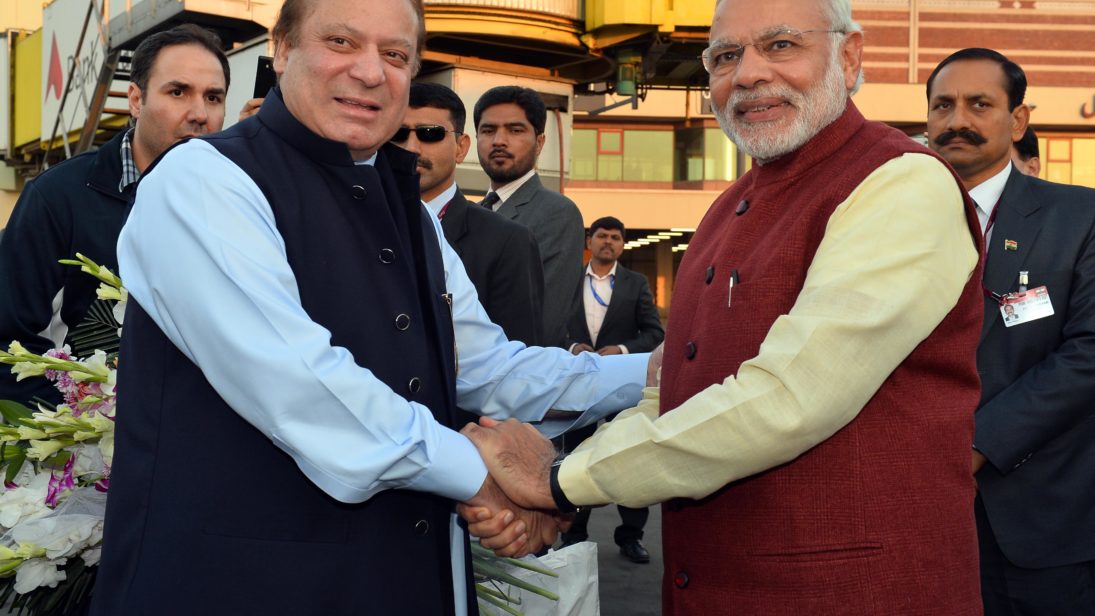
Narendra Modi’s invitation to the government heads of SAARC countries including Pakistan for attending his swearing-in ceremony on May 26 has left many astounded and impressed. While leaders of most of the SAARC countries confirmed their participation much earlier (Bangladesh will be represented by its Parliament Speaker), Pakistan’s Prime Minister Nawaz Sharif finally accepted Modi’s invite after dramatic hesitation lasting for few days. India believes in maintaining good relations with all its neighbours, but it cannot be missed that Modi’s unprecedented gesture is primarily meant for Pakistan. It constitutes a fresh initiative from India for improved regional engagements with Pakistan.
Modi’s diplomatic outreach towards Nawaz Sharif and other SAARC leaders is unique for several reasons. Modi, while conveying to India’s neighbours his belief of vasudhaiva kutumbakam, also sends a strong and positive signal that a majority government shall henceforth conduct India’s foreign policy. Unlike the previous United Progressive Alliance government led by Manmohan Singh, the Modi-led National Democratic Alliance (NDA) will not be tied down to the compulsions of a coalition government. Hence, the new government can be expected to practice out-of-the-box thinking in its management of foreign policy. This is obvious in Modi’s non-paralleled decision to invite Pakistan to his swearing-in ceremony while risking the political disappointment of the Shiv Sena – the second largest ally of the Modi-led NDA. The radical group Shiv Sena’s anti-Pakistan views are well known. The NDA constituent Shiv Sena has been strongly against continuation of any cultural and cricketing ties with Pakistan. After winning 18 seats in the 2014 Lok Sabha Elections, the Sena suggested that the Modi-government should adopt an aggressive “tit for tat” policy against Pakistan for infiltration of terrorists onto Indian soil and should “teach it a lesson” if it stirs difficulties for India.
The Modi-government, irrespective of inviting a domestic backlash from its second largest ally, has taken the bold step to invite Nawaz Sharif to India. Modi is confident that being the majority mandate holder, his political capital would not be challenged by his allies even if they have political differences. Modi has thus taken full advantage of his political position and boldly chosen to extend the invitation to Pakistan. Undoubtedly, Modi’s decision is an exemplary move in statesmanship. His decision reflects not only his confidence but also his penchant for establishing good relations with India’s most troubled neighbours. He has set the ball rolling for amelioration of ties and resolution of thorny issues that have affected Indian and Pakistan alike. Simultaneously, Modi in one diplomatic stroke has put the onus on Pakistan to respond to India’s gestures of cooperation for the resolution of intractable issues bilaterally at official levels instead of resorting to cross-border terrorism. Welcoming Modi’s invitation to Nawaz Sharif, the United States has remarked that amplified engagement with Pakistan is a “positive step”. Presumably Modi will display equal boldness in dealing with its countries in the region.
Modi’s invite to Pakistan did put Pakistan in a catch-22 situation. While Prime Minister Nawaz Sharif was reportedly keen to attend Modi’s swearing-in ceremony, there were substantial speculations whether the Pakistani Army would influence him otherwise. The Nawaz Sharif Government had three options: to accept Modi’s invitation and attend his oath taking event; refuse the invite; or send a representative for Sharif. While the first option is the most welcomed, the second would presumably have strained diplomatic ties. The third option of Sharif’s representative visiting India while not violating any protocol would have certainly failed in measuring up to Modi’s diplomatic outreach to Pakistan. It would have been a dampener to Modi’s bold initiative for amicable and prosperous India-Pakistan bilateral relations.
Nawaz Sharif’s acceptance of India’s invitation has opened several vistas for stable India-Pakistan ties. Undeniably, Pakistan’s affirmative decision reflects on Islamabad’s desire to develop cooperative ties between India and Pakistan. On the sidelines of the swearing-in ceremony a “good and constructive” personal meeting between Sharif and Modi has set the parameters for future bilateral meetings between the foreign secretaries of India and Pakistan. Sharif has assured that he “intended to pick up the threads of the Lahore Declaration of October 1999”. The two leaders identified a common agenda of development and economic prosperity that cannot be achieved without peace and stability in the region. They have agreed to strive to transform confrontation into cooperation.
On the domestic front, Nawaz Sharif’s acceptance of India’s invitation reflects that Pakistan’s politico-military establishment might not be all fragmented on its India policy. Though Sharif’s visit might be at best symbolic, he has been successful in getting the Army and other political sections to approve his visit to India. In India, acceptance of Modi’s invitation by Pakistan might influence the well-known hardline opinion of allies like Shiv Sena to make conclusive judgments in future.
Modi, while extending an olive branch, has stated clearly India’s zero tolerance for increase in incidence of Pakistan backed terror groups in India. India under the new Government might be unwilling to bear another Mumbai massacre any more patiently than it did in November 2008. To prevent a repeat of any Mumbai event or other terrorist attacks, it is time that India and Pakistan exercise prudence and pilot regional peace and stability. Prime Minister Sharif’s acceptance of India’s invitation is as the Pakistani Foreign Office recommended was “an opportunity” which Islamabad did not make the mistake of letting go.
***